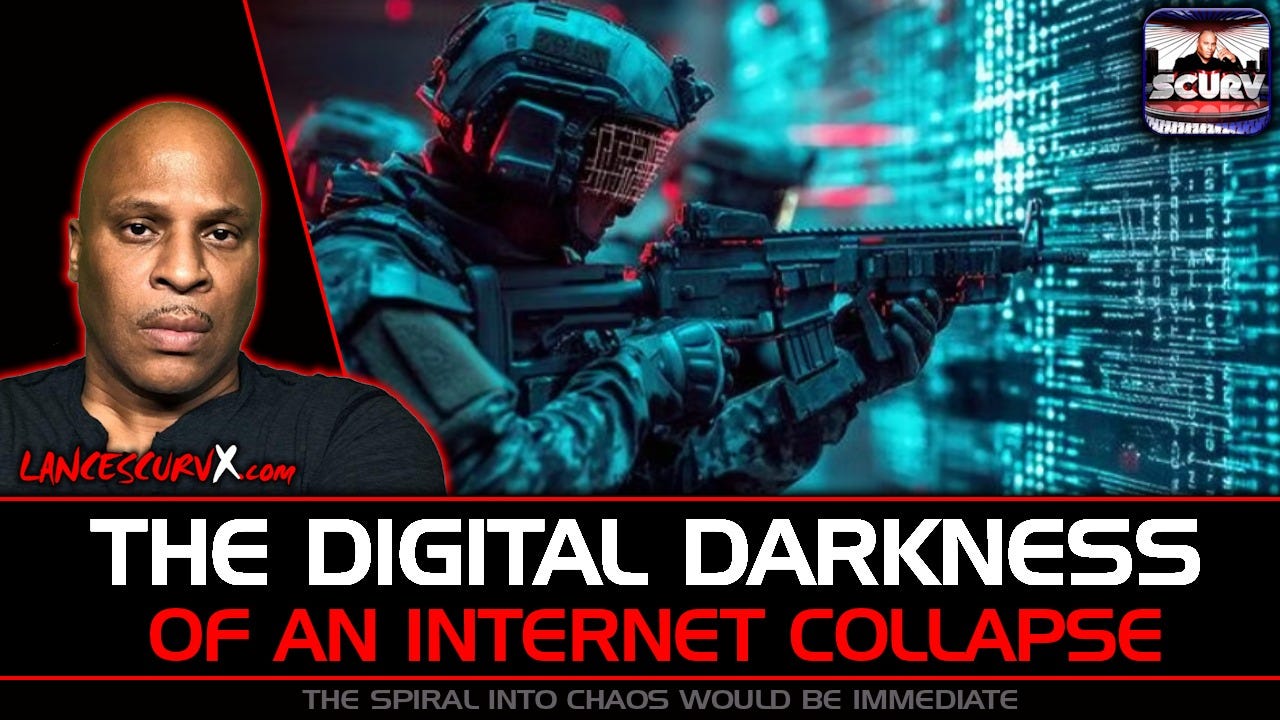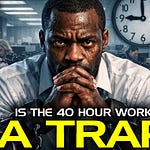Most people today have no idea how fragile their daily life has become. We wake up each morning creating plans for the day, not knowing that everything we depend on is sitting on the thin ice of the Internet and electricity. We trust these systems because they have been around for years, but we forget that none of it is guaranteed. If the Internet was shut down tomorrow—especially if it was done on purpose—most people would be thrown into a world they are not ready to face.
For many of us who grew up before smartphones and apps, life once felt simple. We knew how to move around without a GPS, how to survive without social media, and how to pay our bills without electronic systems. But over time, the world forced us into a new way of living where everything we do, from basic communication to buying food, depends on invisible digital networks. We didn’t run to the Internet. The Internet slowly wrapped itself around us until we had no real choice but to submit to it.
Now we are living in a world where if you do not use the Internet, you can barely survive. Your bank wants you online. Your job wants you online. Stores want you online. Governments all around the world are shifting their identities and services into digital systems. Many countries already push digital IDs, digital money, and full online tracking. America is not far behind. If these systems shut down, even for a few days, the damage would be permanent.
This shared thoughts are a warning. Not a fear tactic, not doom-talk, but a wake-up call. Our community especially needs to hear this because we live in tight spaces, large populations, and heavy financial pressure. When emergencies hit, the Black community feels the impact first and the recovery last. The truth is simple: we cannot afford to be unprepared for something that will shake the whole world.
If the Internet ever goes down—purposely or not—it will not be a small inconvenience. It will be a life-changing crisis that exposes how dependent, unprepared, and controlled people have become. And the people who suffer the most will be the ones who had no backup plan, no stored food, no cash, no protection, and no way to contact their loved ones. This discussion breaks down how that collapse would look, why society would fall apart in days, and what we must do right now to prepare ourselves.
If the Internet was shut down on purpose, the first sign of disaster would be the loss of financial access. Almost every move we make with money is tied to the Internet. Banks, apps, ATMs, transfers—even your direct deposits depend on digital signals. Without the Internet, ATMs become dead boxes. Banks become locked buildings. People would still have money, but none of it could be reached. All you would have is the cash in your pocket, and many people don’t keep cash at all anymore. Businesses would close, stores wouldn’t be able to restock, and work paychecks would freeze. Within days, families would panic because they would not know how they will buy food, medicine, or fuel.
Once stores cannot get money or supply deliveries, food disappears fast. Hunger doesn’t wait for explanations or government promises. Most inner-city communities do not have gardens, local farms, or food storage. Everything depends on trucks hauling food into the cities. No Internet means no fuel ordering, no delivery tracking, no payment systems, and no working registers. Hunger would spread in a matter of days. Parents with crying children will do whatever it takes to feed them. That is when bad decisions become normal reactions, and violence grows.
With stores empty and food gone, the next collapse would be electricity. Many power grids run on automated systems controlled through the Internet. A large shutdown would knock out communication between power stations. Blackouts would spread, and whole cities would fall into darkness. That darkness becomes a different level of danger in communities already dealing with crime, poverty, desperation, and overcrowding. Without light, without alarms, without cameras, people begin to behave in ways they never thought they would. The streets become unpredictable.
Hospitals would struggle next. Yes, they have generators, but generators depend on fuel, and fuel systems depend on digital ordering and digital tracking. Once fuel runs low, hospitals would be forced to choose who receives care and who does not. Machines would stop. Surgeries would be postponed. Doctors and nurses, exhausted and afraid for their own families, would face impossible decisions. The lives of your elders, your children, and anyone with medical needs would hang on a thread.
Travel would freeze. Airports cannot operate without Internet systems. Planes cannot refuel, cannot schedule flights, cannot communicate with towers. People traveling would be stuck in airports with no food, no money, and no way to get home. Highways would clog as people try to escape the cities, but with no fuel pumps working and no GPS navigation, chaos would take over the roads.
Communication would collapse completely. No smartphones. No email. No messaging. No access to the people you love. Imagine being stuck away from your home with no idea if your children, partner, or parents are safe. Imagine trying to walk through a city that has no streetlights, no transportation, and no working emergency services. People will panic just from the fear of not knowing the condition of their families.
One of the most dangerous questions is whether police officers and emergency workers would continue reporting to duty. Many officers would eventually stop. No officer will choose patrolling the streets over defending their own children in a blackout with rising violence and hungry people. Some officers would become vigilantes, focusing on protecting their households while abandoning public duties. This creates pockets of neighborhoods where only the strongest survive, leaving innocent families unprotected.
In cities with millions of people living in tight spaces, the spiral into chaos would be fast. People would fight for food. They would break into stores. They would break into homes. Arguments would escalate into deadly situations because people are scared, hungry, and in the dark. This is not exaggeration. It is simple human nature under pressure.
This is why some people believe an engineered collapse is not impossible. A forced shutdown could push the public into accepting digital IDs, digital money, and full government tracking as the only solution. After enough pain, people accept anything presented as relief. That is how control is gained. The more desperate the masses become, the more power governments can claim over their lives.
But there is another side to this story—the side of preparation. Those who store food, water, and cash will survive longer. Those who have solar power or off-grid setups like wells will stand stronger. Those who maintain personal protection will defend their homes. Those who live in areas with land and space will have room to think and act without the constant pressure of city life.
The truth is that the old ways, before the Internet, were actually more stable for survival. Communities shared resources. People knew how to fix things with their hands. Families cooked, stored food, and built support systems. The skills we once saw as outdated may be the very tools that keep us alive in a digital collapse.
The Black community needs to shift our mindset now. We cannot keep living day to day with no supplies, no savings, and no plans. We must start building a life that does not fall apart if the Internet disappears. We have to learn how to store food, protect our homes, grow small gardens, keep physical cash, and build connections with neighbors we can trust. We also need to reduce our emotional addiction to technology so that our minds remain strong and steady when digital comfort disappears.
If the Internet is ever taken from us—especially on purpose—we will be tested. Some will fall apart. Some will panic. But those who prepare will stand. Preparation is not fear. Preparation is power.
MY FINAL THOUGHTS…
We cannot keep living under the illusion that everything around us is solid. This world is built on wires, signals, and systems that can be unplugged in seconds. When we depend on something we do not control, we give up our stability. And right now, the Internet controls almost every part of our lives. That means the people who control the Internet control our survival.
Our community has always been strong, creative, and adaptable, but strength means nothing if we do not prepare. We must wake up to the truth that modern life is not secure. Food can disappear. Money can freeze. Light can vanish. Safety can collapse. The question is whether we will be ready or whether we will be caught off guard.
The purpose of this article is not to scare you but to open your eyes. We cannot wait until crisis hits to take these matters seriously. We have to shift our thinking now. We have to understand what is at risk and what it will take to survive if these systems fall. We must reclaim the old ways of living, the natural ways, the grounded ways that kept our ancestors alive long before there was an Internet to depend on.
If we begin preparing slowly, consistently, and intelligently, we can protect ourselves from the worst outcomes. We can store food, gather water, build economic strength, and form community networks. We can create a life where we are not vulnerable to a system that can disappear with one switch. The future may be uncertain, but our preparation can be solid.
Let this be a wake-up call to every inner-city household, every Black family, every parent, every elder, and every young person: the time to prepare is now. Because the moment the Internet goes dark, the world will change instantly. And the people who took the warnings seriously will be the ones who survive the storm.













